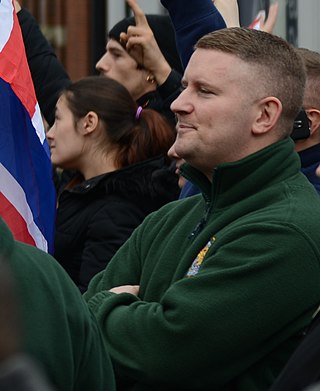Upskirting or upskirt photography is the practice of taking photographs or videos under a person's skirt or kilt, capturing an image or video of the crotch area, showing underwear such as panties, and sometimes genitalia. An "upskirt" is a photograph, video, or illustration which incorporates such an image, although the term may also be used to refer to the area of the body inside a skirt, usually from below and while being worn.
Christopher David Denning was an English radio presenter and sex offender. His career effectively ended when he was convicted of sexual offences in 1974. He was imprisoned several times in the United Kingdom, Czechia and Slovakia between 1985 and his death in custody in 2022.

The Communications Act 2003 is an Act of the Parliament of the United Kingdom. The act, which came into force on 25 July 2003, superseded the Telecommunications Act 1984. The new act was the responsibility of Culture Secretary Tessa Jowell. It consolidated the telecommunication and broadcasting regulators in the UK, introducing the Office of Communications (Ofcom) as the new industry regulator. On 28 December 2003 Ofcom gained its full regulatory powers, inheriting the duties of the Office of Telecommunications (Oftel). Among other measures, the act introduced legal recognition of community radio and paved the way for full-time community radio services in the UK, as well as controversially lifting many restrictions on cross-media ownership. It also made it illegal to use other people's Wi-Fi broadband connections without their permission. In addition, the legislation also allowed for the first time non-European entities to wholly own a British television company.
Frederick Wilson Talbot is a British former television presenter. He grew up in north west England.

In the United Kingdom, the Violent and Sex Offender Register (ViSOR) is a database of records of those required to register with the police under the Sexual Offences Act 2003, those jailed for more than 12 months for violent offences, and those thought to be at risk of offending. In response to a Freedom of Information request in 2009, for example, Greater Manchester Police reported that of 16 people in their area placed on ViSOR since 2007 on their initiative and not as a result of a relevant conviction, four (25%) had clean criminal records.

HM Prison Manchester is a Category A and B men's prison in Manchester, England, operated by His Majesty's Prison Service. It is still commonly referred to as Strangeways, which was its former official name derived from the area in which it is located, until it was rebuilt following a major riot in 1990.

New Brighton railway station serves the suburb of New Brighton in Wallasey, Merseyside, England. It is situated at the end of the New Brighton branch of the Wirral Line 8.25 miles (13.28 km) west of Liverpool Lime Street on the Merseyrail network.
Preventive detention is an imprisonment that is putatively justified for non-punitive purposes, most often to prevent further criminal acts.
Curtis Francis Warren is an English gangster and drugs trafficker who was formerly Interpol's Target One and was once listed on The Sunday Times Rich List.

Lesbian, gay, bisexual, and transgender (LGBT) people in Malaysia face severe challenges not experienced by non-LGBT residents. Sodomy is a crime in the country, with laws enforced arbitrarily. Extrajudicial murders of LGBT people have also occurred in the country. There are no Malaysian laws that protect the LGBT community against discrimination and hate crimes. As such, the LGBT demographic in the country are hard to ascertain due to widespread fears from being ostracised and prosecuted, including violence.
Andy Sherry was one of the most senior British practitioners of Karate and the retired chief instructor of the Karate Union of Great Britain. Sherry was unanimously convicted at Liverpool Crown Court of five criminal offences of a sexual nature relating to two victims, and sentenced to two years in prison and ordered to sign the Sex Offender Register for 10 years.
Simon Guy Sheppard is a British far-right extremist from Hull, England, who runs a number of websites that promote misogynist and antisemitic doctrines. His main website contains many articles about women, the multiracial society, and Jews, stating that they have negative effects upon western society and for white males in particular.
Sidney Charles Cooke is an English convicted child molester, murderer and suspected serial killer and serial rapist serving two life sentences. He was the leader of a paedophile ring suspected of up to twenty child murders of young boys in the 1970s and 1980s. Cooke and other members of the ring were convicted of three killings in total, although he was only convicted of one himself.

On 12 February 1993 in Merseyside, England, two 10-year-old boys, Robert Thompson and Jon Venables, abducted, tortured, and murdered a two-year-old boy, James Patrick Bulger. Thompson and Venables led Bulger away from the New Strand Shopping Centre in Bootle, where Bulger was visiting shops with his mother. His mutilated body was found on a railway line two and a half miles away in Walton, Liverpool, two days later.
Hate speech laws in England and Wales are found in several statutes, and differ slightly from the laws adopted in Scotland. Expressions of hatred toward someone on account of that person's colour, race, sex, disability, nationality, ethnic or national origin, religion, or sexual orientation is forbidden. Any communication which is threatening or abusive, and is intended to harass, alarm, or distress someone is forbidden. The penalties for hate speech include fines, imprisonment, or both.

The Protection of Children and Prevention of Sexual Offences (Scotland) Act 2005 is an Act of the Scottish Parliament. The Protection of Children and Prevention of Sexual Offences bill was announced to the parliament by the First Minister of Scotland, Jack McConnell, in September 2004. It was passed on 2 June 2005, receiving Royal Assent on 12 July. The act introduced new offences related to child grooming, which had been addressed in England and Wales under the Sexual Offences Act 2003.

National Action is a British far-right fascist and neo-Nazi terrorist organisation based in Warrington. Founded in 2013, the group is secretive, and has rules to prevent members from talking about it openly. It has been a proscribed organisation in the United Kingdom under the Terrorism Act 2000 since 16 December 2016, the first far-right group to be proscribed since the Second World War. In March 2017, an undercover investigation by ITV found that its members were still meeting in secret. It is believed that after its proscription, National Action organised itself in a similar way to the also-banned Salafi jihadist Al-Muhajiroun network.

Paul Golding is a British political leader who has served as the leader of Britain First, a far-right political party in the United Kingdom. He grew up in Erith.
A child sexual abuse scandal involving the abuse of young players at football clubs in the United Kingdom began in mid-November 2016. The revelations began when former professional footballers waived their rights to anonymity and talked publicly about being abused by former coaches and scouts in the 1970s, 1980s and 1990s. This led to a surge of further allegations, as well as allegations that some clubs had covered them up.
Jack Andrew Renshaw is a British convicted child sex offender, terrorist and former spokesperson for the neo-Nazi organisation National Action. He was an economics and politics student at Manchester Metropolitan University and an organiser for the British National Party (BNP) youth wing, BNP Youth. On 12 June 2018, Renshaw pleaded guilty to preparing an act of terrorism, with the intention of killing the Labour MP Rosie Cooper, and to making a threat to murder a police officer.








